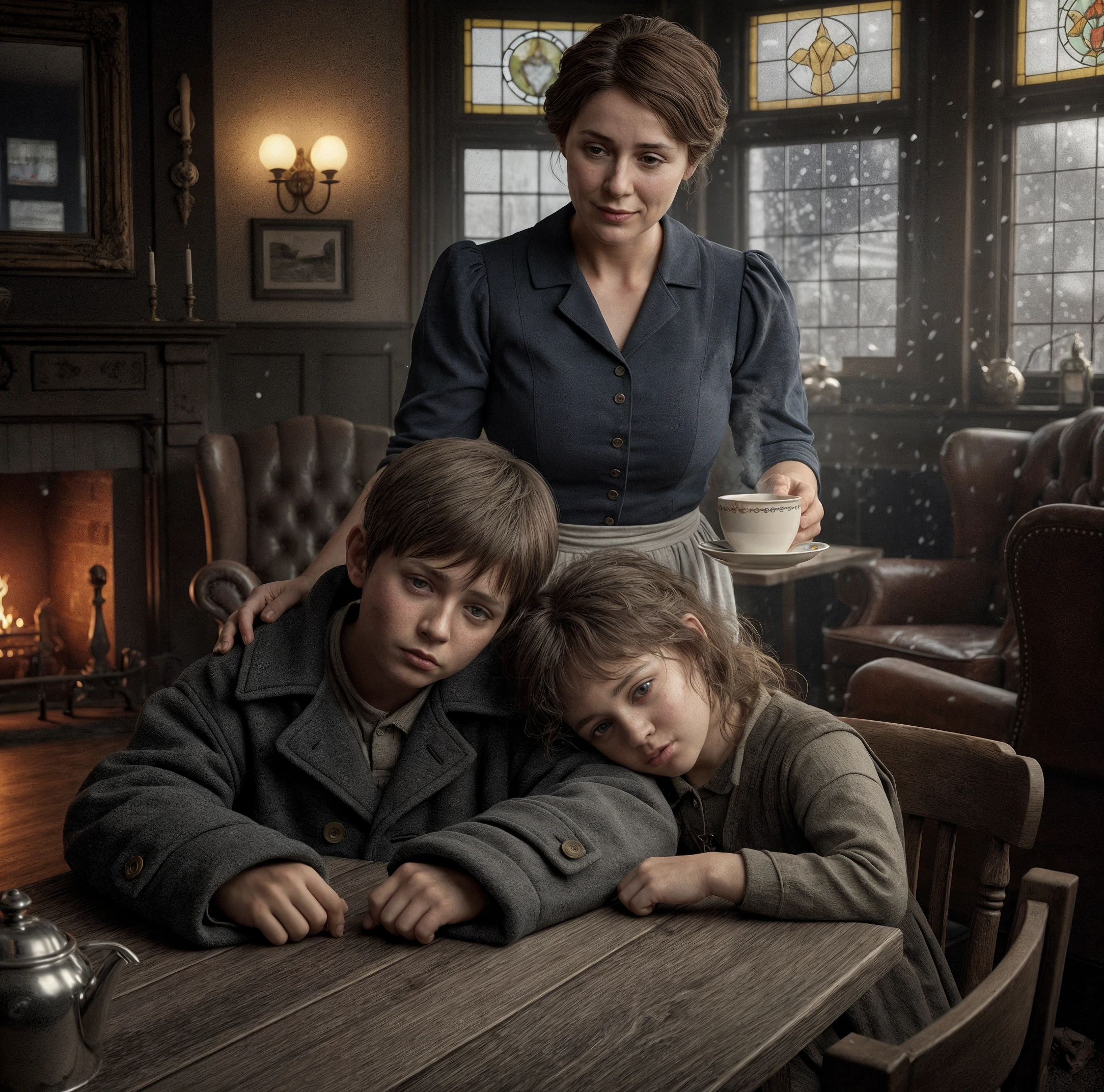On a damp September morning in Detroit, the city stirred to life beneath heavy clouds. Rain whispered down the cracked windows of Evelyn Harris’s modest diner, nestled between two abandoned storefronts. A flickering neon sign buzzed above the door: Evelyn’s Kitchen – Open Late, Open Heart.
Inside, the air carried the scent of cinnamon and burnt coffee. Evelyn, now in her fifties, wiped the counter absently, her thoughts drifting. Business had dwindled since the factory two blocks over shut down. Still, she stayed open—more for the neighborhood than for herself.
It had been fifteen years since that freezing morning she first met Caleb and Sarah—two half-frozen children outside her diner. She hadn’t seen them since. But not a week passed without her wondering.
Today, however, something was different.
At precisely 11:27 a.m., a man stepped through the door. Tall, sharply dressed, eyes sharp with focus. He was followed by a poised woman, elegant in a beige trench coat.
Evelyn’s breath caught. She nearly dropped the coffee pot.
“Caleb?” she asked, heart pounding.
He smiled, and beside him, Sarah did the same. “You remember us,” she said.
“How could I forget?”
They sat together in the booth by the window, the same booth where they once drank hot chocolate, trembling with cold and fear. But something about them—beyond their success—made Evelyn uneasy. There was intensity in Caleb’s eyes. Urgency.
“We found something,” Caleb said. “It’s about the diner. About you.”
Evelyn raised an eyebrow. “The diner?”
Caleb slid a weathered envelope across the table. “We started looking into your background—because we wanted to honor you. A scholarship, maybe a foundation in your name.”
Evelyn looked confused. “That’s kind, but I don’t—”
“You were adopted, weren’t you?” Sarah interrupted gently.
The air shifted.
“Yes,” Evelyn said slowly. “Fostered. Bounced around a lot. Why?”
Caleb tapped the envelope. “That’s not all. Your birth records were sealed—but with some effort… we found your birth certificate. And a journal. From your mother.”
Evelyn stared. Her fingers trembled as she reached for the envelope. Inside was an aged document… and a photograph. A woman with kind eyes. She wore a necklace shaped like a tiny bird.
“My mother…” Evelyn whispered.
“Her name was Angela Harris,” Sarah said softly. “She died in 1978. But before that, she hid something. Here. In this diner.”
Evelyn blinked, stunned. “What?”
Caleb pulled out a folded blueprint. “This building used to be a safehouse during the Civil Rights Movement. Underground networks used it. Your mother was part of that. When she disappeared, many believed she was hiding something valuable. Something dangerous.”
Evelyn’s voice was barely a whisper. “Like what?”
“A ledger,” Caleb said. “Names of informants, whistleblowers, and secret funds diverted to protect families. She kept it hidden because she feared it would fall into the wrong hands.”
“But that was decades ago,” Evelyn murmured. “Why bring this to me now?”
Caleb met her eyes. “Because the man who’s been buying up this neighborhood—the one trying to shut you down—he’s not just a developer. He’s a direct descendant of one of the men named in that ledger. And he’s been looking for it too.”
Sarah leaned forward. “He knows you’re her daughter. That’s why the offers on the diner keep increasing. He’s not after the land. He wants the past buried.”
A silence settled over the table.
Evelyn’s thoughts whirled. She stood, moving to the corner of the diner, to a spot where the floor always creaked—right under booth four. She knelt and pried at the old floorboards.
After a few minutes, her fingers scraped metal.
She pulled out a rusted tin box.
Inside, wrapped in waxed cloth, was a leather-bound journal. Names, dates, transactions. Along with it, a locket—inside was a picture of a baby. Evelyn.
Sarah covered her mouth in awe.
Evelyn stood slowly, emotion tightening her throat. “All these years… right beneath my feet.”
Suddenly, the door burst open. A man in a dark coat stepped in, flanked by two others. He looked around with the cold eyes of a man used to control.
“Miss Harris,” he said. “I trust we’re not interrupting.”
Caleb stood protectively. “You’re not welcome here.”
The man smiled thinly. “I believe you’ve found something that belongs to my family.”
Evelyn straightened, the journal held firmly in her hands. “This was hidden for a reason.”
He stepped closer. “There are people who would pay a great deal for what’s in that journal. Or to see it destroyed.”
Evelyn didn’t flinch. “I’m not interested in money.”
Caleb stepped forward. “We’ve already made digital copies. Sent to journalists, lawyers, and a few museums.”
Sarah added, “Try anything—and the truth goes viral by morning.”
The man’s face tightened. Then, after a long pause, he turned on his heel and walked out into the rain.
Weeks passed.
The journal’s release sparked headlines. Corruption exposed. Families vindicated. Streets were renamed, funds returned to forgotten causes. Evelyn’s diner—once on the verge of closure—became a historic site, protected by the city.
She never asked Caleb and Sarah how they found so much. How they dug so deep. But one night, sitting in booth four, Evelyn asked them both, “Why me? You didn’t owe me anything.”
Sarah smiled. “You gave us food once.”
Caleb nodded. “But more than that—you gave us dignity. That morning, you made us feel like we mattered.”
Evelyn’s eyes shimmered.
“But we weren’t just returning the favor,” Caleb added. “We found you… because we needed you to know—you were always part of something bigger.”
And Evelyn realized, maybe kindness wasn’t just about warmth and meals.
Maybe it was a seed, buried deep—waiting, always, to rise.
